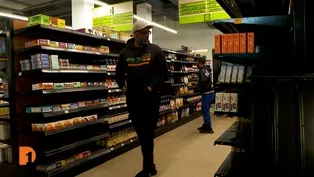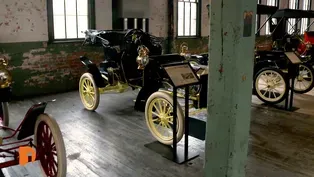
Veterans push to rename Post Traumatic Stress Disorder
Clip: Season 8 Episode 45 | 9m 5sVideo has Closed Captions
Two Michigan Vietnam veterans are pushing to rename Post Traumatic Stress Disorder.
A significant shift in the discourse surrounding veterans’ mental health is on the horizon. Advocates are pushing to change Post Traumatic Stress Disorder to Post Traumatic Stress Injury to reduce stigma and encourage individuals to seek treatment. One Detroit’s Bill Kubota talks with local Vietnam veterans about their efforts to rename the condition.
Problems with Closed Captions? Closed Captioning Feedback
Problems with Closed Captions? Closed Captioning Feedback
One Detroit is a local public television program presented by Detroit PBS

Veterans push to rename Post Traumatic Stress Disorder
Clip: Season 8 Episode 45 | 9m 5sVideo has Closed Captions
A significant shift in the discourse surrounding veterans’ mental health is on the horizon. Advocates are pushing to change Post Traumatic Stress Disorder to Post Traumatic Stress Injury to reduce stigma and encourage individuals to seek treatment. One Detroit’s Bill Kubota talks with local Vietnam veterans about their efforts to rename the condition.
Problems with Closed Captions? Closed Captioning Feedback
How to Watch One Detroit
One Detroit is available to stream on pbs.org and the free PBS App, available on iPhone, Apple TV, Android TV, Android smartphones, Amazon Fire TV, Amazon Fire Tablet, Roku, Samsung Smart TV, and Vizio.
Providing Support for PBS.org
Learn Moreabout PBS online sponsorship(light music) - [Bill] Williamston population 3,820 miles east of Lansing, Kent Hall, Vietnam vet and community leader has another meeting tonight.
(car door closing) How you doing?
- Good, how are you?
- [Bill] He served on city council, now he chairs the parks and rec committee.
- Motion to excuse Maggie and Wolf?
- Kent nominated me for mayor in 2016, and we've had a, the friendship has blossomed ever since.
- You've cut through the bureaucracy sometimes to make good happen.
It's for the betterment of the community.
- Do you know the two most important days of your life is the day you were born and the day you figure out why.
I figured out my why, and it's what I'm doing, and it feels good - [Bill] Hall's why, helping veterans cope with post-traumatic stress.
His group, Honor for All, led by another Vietnam vet, Tom Mahany.
Now Hall's story starts in Linden, near Flint, high school class president, top athlete, a champion pole vaulter.
It was the 1960's, in college he had a shoulder injury that needed surgery.
- I lost my deferment by dropping out for one semester.
(Kent laughs) They snatched me right away.
- [Bill] In the army he spent time in Europe, the back end of his tour, Vietnam.
- I never saw so many mortars and explosives go out, it was like it was fire all around.
- [Bill] Post-traumatic stress?
Hall didn't know he had it, the term didn't even exist yet.
In Linden he finished college, worked, became a city councilman, an upstanding citizen, so everyone thought.
- I was 40-years-old when I just couldn't take it anymore.
I mean, I had three beautiful kids, I had a beautiful wife, and I didn't wanna live anymore.
So I started (Kent sighs) suicide by cop.
- [Bill] Hall made the news in 1986, they called him the jogging bandit, former star athlete turned bank robber.
- I robbed 13 banks with a toy gun, but they called me the jogging bandit 'cause I didn't run away I just, come on and catch me.
Well the first one was right in Grand Blake, the second one might've been Grand Blake.
They were all Michigan national banks until the one in Ohio.
- [Bill] Michigan National?
Hall didn't like them.
- They gave me a hassle about a car loan.
(interviewer laughs) (Kent laughs) - [Bill] For that, six-and-a-half years in federal prison.
- I was an elder in the church, I was a councilman in the city of Linden.
In fact, the night before my arrest, I was re ordained as an elder in the Presbyterian church there.
- [Bill] Hall rebuilt his life, eventually moving to Williamston.
Hall's Honor for All partner Tom Mahany, he's got a story too.
- Was started.
- [Bill] He lives in Royal Oak, a stone mason artist, as a child destined for the US Military Academy.
But Mahany was conflicted about Vietnam when he was a cadet at West Point.
- I was reassigned to the infantry when I was released on West Point.
And I was released on West Point because I had different views of what Vietnam was, and what we should be doing about it.
And that was in '68.
I spent the next year and a half in the Army.
- [Bill] When Mahany got back, he headed to Washington.
Unhappy with the US taking the war to Cambodia, he joined another hunger striker at the Capitol.
He'd hold other hunger strikes by himself more recently against the stop loss policy during Iraq and Afghanistan, forcing soldiers to keep serving long past their scheduled release dates.
(guns firing) And he spoke about the high suicide rates among veterans.
- Suicides keep going, the battle stops, but the suicides keeps going.
- [Bill] It's estimated as many as 22 veterans will kill themselves each day.
- Your brother-in-Law, right was?
- Well, yeah, my brother-in-Law, he committed suicide back in the eighties.
- But that was part of your motivation too, right?
- Yeah, well I saw what it did to my sister and our two little boys, - Right.
- So how long were you actually on that hunger strike?
- 29 days.
- [Bill] Mahany in Washington, a one man lobbyist for veterans mental health.
- I take him a new letter every day, tried to get somebody to listen, and it was finally Carl Evans office that listened.
- See, I've never heard this story before.
- No.
- Don't really get into each other's personal you know.
- I like to talk about what's gonna happen instead of what happened.
Because most of what happened wasn't that good.
- This is the Honor for All trail, and it's all been approved by City Council, the Parks Commission, and the Planning Commission.
- These are tulips.
- [Man] These are tulips.
- These are tulips and these are daffodils.
- [Bill] Big plans, more work needed at Williamson's Memorial Park on the banks of the Red Cedar River.
With the section dedicated to Veterans, hope is someday a national monument too.
- That's what this park is all about.
You gotta work something out, you can come here and work it out, or at least work on working it out.
(people talking indistinctly) - [Bill] Still a bigger project dealing with that term PTSD, Post-Traumatic Stress Disorder.
Psychiatrist, Frank Ochberg medical Advisor for Honor for All, he ran Michigan's Department of Mental Health and helped define PTSD as a diagnostic term in 1980.
- What we based it on, it had a lot to do with the Vietnam War.
It also had a lot to do with women and what women were very concerned about at the time.
- [Bill] Amongst them, the second wave feminist leaders like Gloria Steinem who tied sexual assault and domestic violence to traumatic stress.
- I saw it as the two genders coming together to define something worthy of putting, not just in the psychiatric dictionary, but the General Medical Dictionary.
- [Bill] The mission changed the term PTSD to PTSI, post-traumatic stress injury, and get that in the diagnostic manual, the DSM.
So all can know the problem is not their fault.
It's an injury to be treated like any other injury, as you would say, a broken leg.
- Well if I admit to having post traumatic stress disorder, I'm disordered, so I'm not gonna admit it.
And if I'm not gonna admit it, then I'm not gonna get treatment for it.
This is a file containing all the resolutions from all the states starting back in 2014, - [Bill] PTSI, Mahany's been working on this for 11 years, collecting resolutions from Michigan, then 46 other states in both chambers of Congress.
- And it's going to lessen their guilt, and it's gonna cut down on suicides.
Okay, that's it for the crocuses.
- [Bill] Tom Mahany, Dr. Frank Ochberg, and Kent Hall, have helped change some minds, but they want to change a lot more.
(people speaking indistinctly) - So it's getting there, but it's not getting there quickly enough.
So I wanna show you my graphic here, PTSI, not PTSD.
- [Bill] In Chicago, Doctor Eugene Lipov treats traumatic stress.
He shows the trauma is visible in brain scans, and says he can prove the name change can help.
- So I did a survey, which I published in 2023, and presented American Psychiatric Association.
The body that controls the naming, turns out yes, if you change the name, the stigma will get better.
- I think now we have the evidence to change it.
I think when we do change it, there will be a celebration that we've done the right thing.
- [Bill] The American Psychiatric Association confirms the PTSI proposal is now under initial evaluation by the DSM Steering committee.
Perhaps the is coming soon, driven in part by a little nonprofit in Williamston, Michigan.
- We have a wall of honor there and all the people on the wall of honor died in action, and we're here to honor them today.
But there's another bunch of people that might have died years later, even at their own hands possibly, and those are the victims of post-traumatic stress issue, and they deserve honor.
It's as though that sniper's bullet took years or months or whatever to actually strike, and the hell they went through before they got there.
Detroit People’s Food Co-op broadens healthy food access
Video has Closed Captions
The Detroit People’s Food Co-op grocery store has opened in the North End neighborhood. (6m 19s)
Ford Piquette Avenue Plant Museum preserves Detroit history
Video has Closed Captions
The Ford Piquette Avenue Plant Museum is preserving Detroit’s automotive history. (4m 6s)
One Detroit Weekend: May 10, 2024
Video has Closed Captions
Celebrate Mother’s Day, Asian American and Pacific Islander Heritage Month and more. (1m 53s)
Providing Support for PBS.org
Learn Moreabout PBS online sponsorshipOne Detroit is a local public television program presented by Detroit PBS














